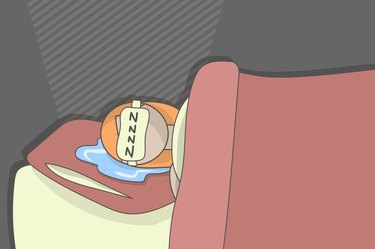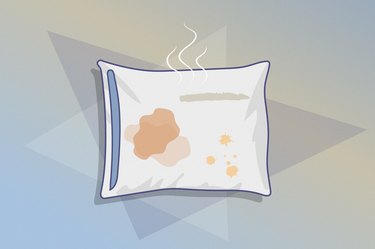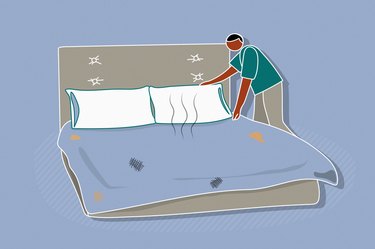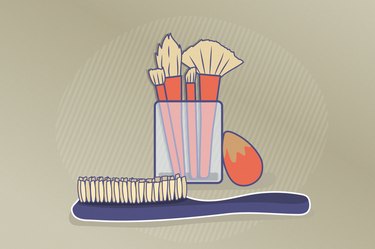
It can be tempting to lie in bed and fall asleep right after showering, especially if you've had a long day. Sleeping with wet hair isn't a crime, of course — but there could be some long-term consequences.
Wet hair can be a breeding ground for all kinds of creepy organisms, including bacteria and fungi. And the growth of these tiny microorganisms can lead to infections on your scalp.
Video of the Day
Video of the Day
We chatted with two doctors to discover the effects of sleeping with wet or damp hair and got their best practices to avoid it.
3 Effects of Sleeping With Wet Hair
1. Bacterial Growth
When you sleep on wet hair, the heat from your head and the water creates moisture. Unfortunately, this can serve as a breeding ground for microorganisms and "can lead to an environment that favors bacterial and fungal growth on pillows," says Boston-based physician Po-Chang Hsu, MD.
This also applies to damp hair, which can bring moisture to the pillow, "creating the same environment as wet hair," he adds.
2. Fungal Infections
Sleeping with wet hair can also increase the risk of fungal infections on your scalp, says Dr. Hsu. One type of fungi that can grow is Malassezia, which can lead to dandruff or dermatitis.
3. Hair Breakage
Wet hair is more fragile, making it more susceptible to split ends. Tossing and turning while you zzz can also create friction, making your wet hairs more prone to breakages, Dr. Hsu says.
Related Reading
Safer Ways to Sleep on Wet Hair
1. Use a Towel
If you don't have time to add between rinsing and sleeping, Nilong Vyas, MD, a board-certified pediatrician and medical review expert at the Sleep Foundation, recommends using an absorbent towel to soak up as much water as possible.
"Wrap the wet hair in a towel until close to bedtime and then run a hairdryer through to eliminate the remaining dampness," she says.
2. Apply a Leave-In Product
To prevent hair breakage, you can use a leave-in hair moisturizer or conditioner. The leave-in coats your strands with protective layers of oils and prevents your hair from tangling or breaking.
3. Swap Your Pillowcase for Silk
Tossing and turning can create unnecessary friction between your hair and the pillowcase. The good news is that you can swap your pillowcase. Instead of cotton, which can cause friction between your hair and pillow, opt for a silk one. Silk pillowcases tend to be smoother and will decrease the friction against your hair and skin.
So, How Bad Is It Really to Go to Bed With Wet Hair?
While wet hair is unlikely to make you sick, we'd recommend sleeping with dry hair to prevent bacteria or fungus from growing.
To prevent sleeping on wet hair, use absorbent towels, time your hair wash strategically and swap your pillowcase for a silk one to decrease friction. You can also use a blow dryer to quicken the process.
Is this an emergency? If you are experiencing serious medical symptoms, please see the National Library of Medicine’s list of signs you need emergency medical attention or call 911.



